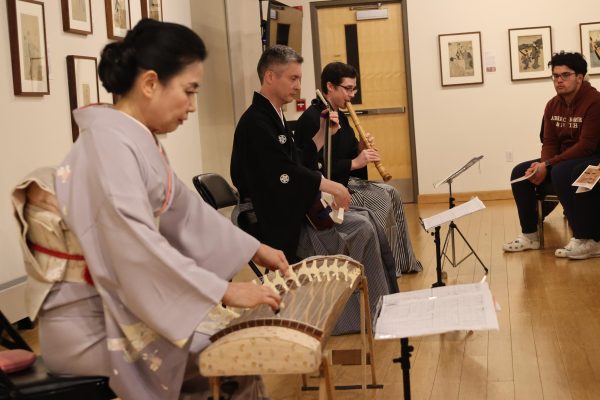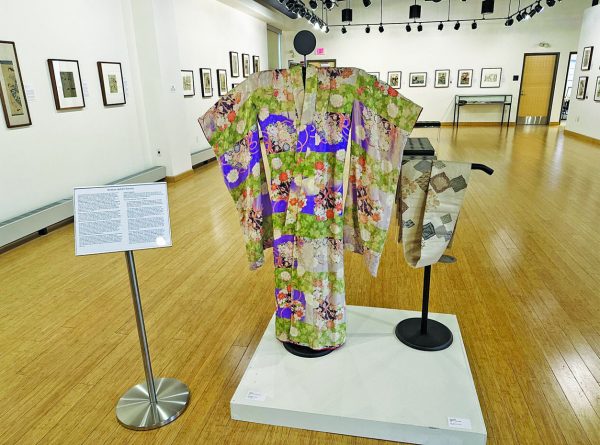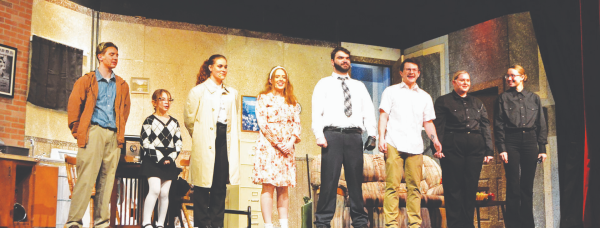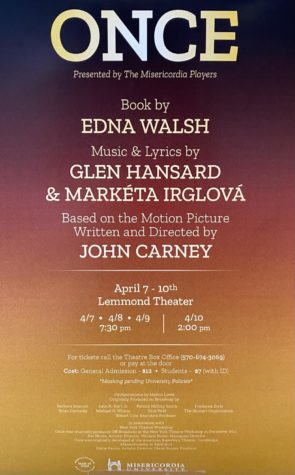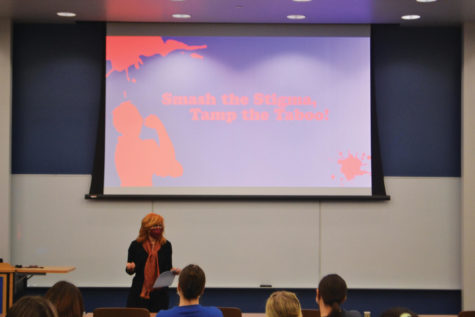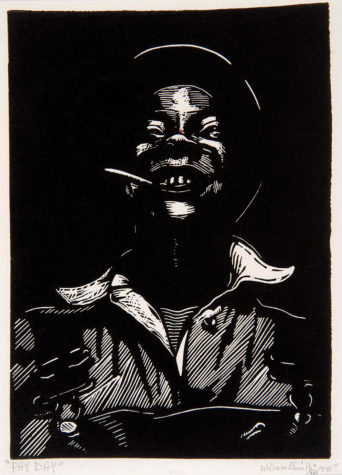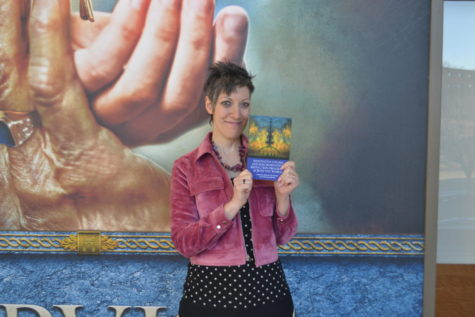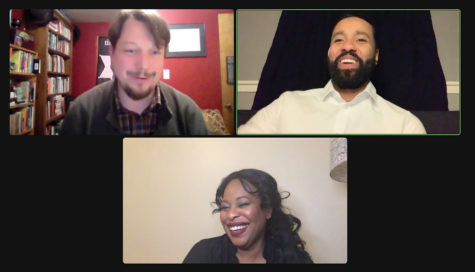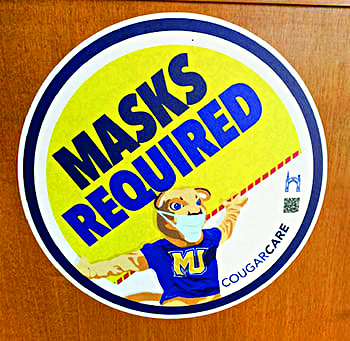SLP Major: Music is ‘Communication of Ideas’
May 2, 2018
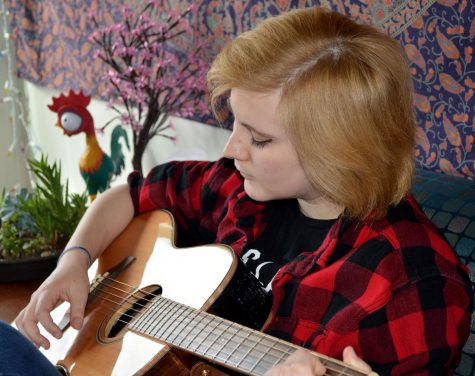
Becca Cristino strums her guitar.
As a late evening in February wound down, fourth-year speech language pathology major, Rebecca Cristino, picked up her guitar and began to serenade her roommates and her neighbors when someone shouted for her to play “Wonderwall.”
“You asked for ‘Wonderwall,’” Cristino said, “but you’re getting ‘Neutral Milk Hotel.’”
Cristino then played and mimicked the voices of several indie rock bands, including Sufjan Stevens, going so far as to learn the chords to “Kettering” by the Antlers in mere minutes when asked.
Cristino began playing instruments early in her life, beginning with piano. She was five when this adventure began, prompted by her parents’ view that music is a good opportunity for a child. Cristino felt that playing in a band seemed like the most fun thing in the whole world. Her perspective comes from watching reruns of ‘The Monkeys’ with her mother when Cristino was about three years old.
“I just thought that was the coolest thing ever,” Cristino said. “They looked like they were having such a good time, because I was three and I didn’t understand that it was TV.”
She learned to play many instruments since her start at the ivories. Her immersion in music kept Cristino passionate about her interest rather than feeling obligated to do it because her parents wanted her to.
“I moved on to guitar lessons— dropped both those lessons— kept playing more on my own because I wanted to learn all the songs that I liked, and they just wanted to teach me a bunch of boring stuff.”
This is also the reason why Cristino quit piano. Instead of doing what her teacher wanted her to do, she learned Pink Floyd songs.
“I just kept accumulating instruments, because people would like, ‘Try to start little garage bands in middle school’ and nobody played bass? Need a bass player? Okay, it’s the top four strings of a guitar, right? I’ll do that. Listen to The Who one time? Oh my God, I want to play drums now. I want to do a bunch of crazy stuff and have people think I’m the funniest person alive and play the drums like a crazy person.”
She took up the trumpet because it was a band instrument that she could play in middle school.
“My parents wanted me to play flute because my mom had a flute in the closet, but… eh. Then I wanted a saxophone, but my parents said no, because my mom hates it, so I got the trumpet because they wanted me to play Earth, Wind and Fire. That’s literally why I started playing the trumpet.”
Cristino said the rest of the instruments came about because of curiosity. If she sees an instrument, she will try to play it.
“If someone has a weird instrument in the corner, I’m like, ‘Let me try to figure this out.’ Almost like a puzzle, you know, with your knowledge of all the other ones. You feel like, ‘How do I crack this code? How do I do this one?’”
Cristino said that if she could play any instrument, she would want to master drums. She quit drum lessons too early to produce the results she would like, and she does not practice enough.
“I don’t commit to what I’m doing, and because it’s a lot of movement, you can’t hesitate. Otherwise it’s going to be an awful beat, it’s going to sound gross. I wish I could either relearn drums or like actually learn drums. If that counts. If not, sitar would be wild.”
Five year old Cristino was very interested in The Beatles.
“Love me some George Harrison,” Cristino said.
Cristino is in a band that goes by the working name Mizu, and she admits that she finds it difficult to budget her time between her work load and her music.
“I have to make sure I get my clinic paperwork done during the week, like my projects and assignments and classwork done because I go home basically every weekend if I can.”
Schoolwork comes first, so she always makes sure that everything she needs to do for school is done before she goes home to work on her music. Week nights consist of staying up late so that everything that needs to get done is done, and the weekends are free to pack in as much music as possible.
“I don’t know if I’m managing it well, but both seem to be getting done pretty successfully, so I’ll take it. I’ll take that as a win.”
One of the most interesting facts about Cristino is that she is deaf in her left ear. Her cochlea never fully formed, so she does not hear a lot of high frequency sounds. If she is in a room with a lot of background noise, she can’t read the lips of the person she is speaking to.
“The cochlea is supposed to look like a snail shell, and the one in my left ear is basically a sad little nub, so it only really registers a couple of frequencies well, and even at that the signal is just really distorted,” said Cristino.
Cristino compensates for her left ear with her right one, looking for facial expressions, lip reading, and decoding context clues so she can maintain a conversation.
She makes jokes easily.
“So when people are like, ‘Oh, you have a great ear for music,’ I’ll be like, ‘Yep! Just one!’”
Sometimes Cristino has difficulty tuning her instruments if she does not have a tuner. She has invested in musician’s earplugs, which lowers the decimal levels of all frequencies equally.
“It sort of squishes the sound,” said Cristino, “as if you were turning down the volume on a phone or an iPod or on your laptop. So you still hear everything clearly, just quieter.”
Some of Cristino’s friends, who are also musicians, have asked about their hearing because of how much sound they are regularly exposed to. Cristino has recommended earplugs to many friends who have begun to lose their hearing.
“They’re like, ‘You can screen hearing, right? That’s within your scope of practice? Can you screen my hearing?’ And I’m like, ‘If you want to drive two hours, yeah. Come through!’”
Since Cristino hears lower frequencies the best, she’s been told that is why she gravitates toward the bass. She isn’t sure if that’s true.
Cristino’s passion for both music and speech language pathology is similar has a common source, she said: the human need to communicate.
“It’s the communication of ideas, and all art is that? When you are born with less of an ability to communicate your wants and needs, or you have that and you lose it from something like a stroke, or there’s someone with a fluency issue and is afraid to actually ask what they want because they’re just so worried they’re going to stutter on a word – any disruption of the communication of ideas is just such a rough time to experience, and so to be able to help get that back to someone is kind of like what music will do to someone who feels a little lost, you know? Like it brings the communication of ideas, it facilitates that.”
Since most of her clinical experience has been in pediatrics, she has observed how children react to music.
“So you can tie the two together, because there’s probably some overlap with some of the benefits of music therapy. That’s automatic in preserved language as well. Like sometimes if someone has aphasia, they might not be able to volitionally retrieve and express some of the words that they’re trying to get to, but a song will come right out and help get the words flowing.”
Cristino wants to further explore the ties between speech and music as she pursues both paths.

